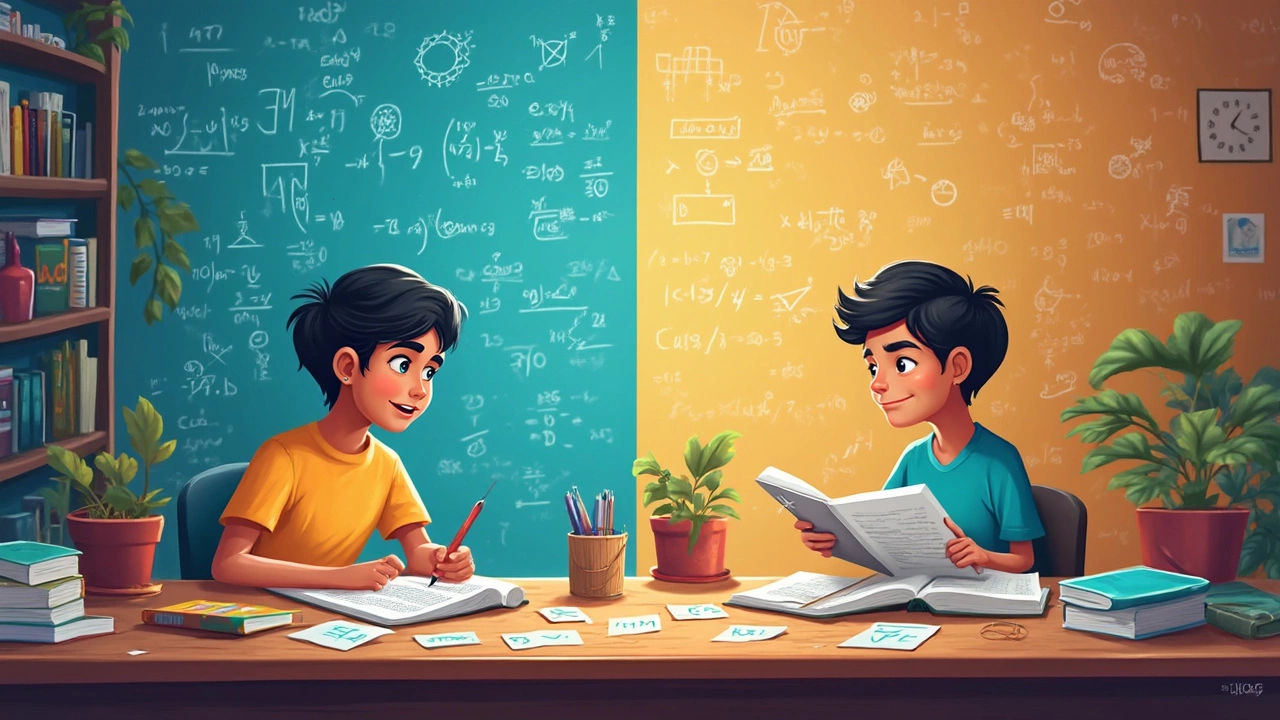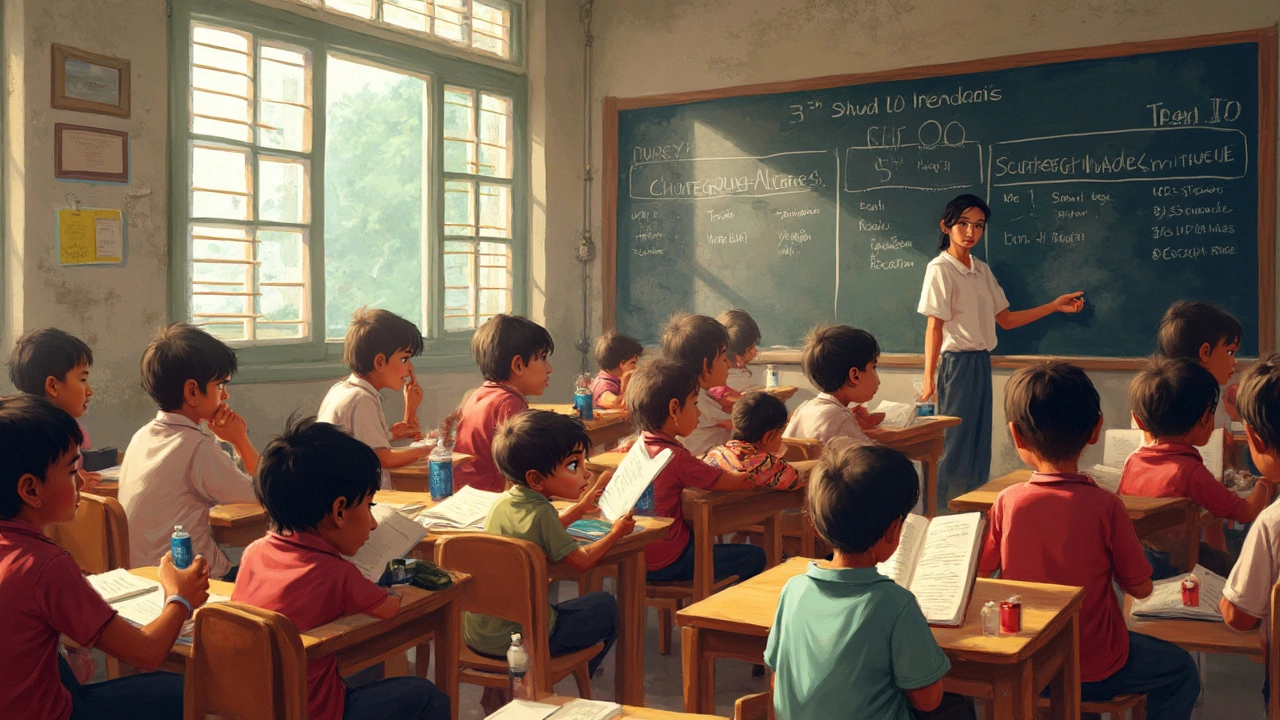If you've ever wondered which board really gives students the toughest time in India, you're not alone. With CBSE, ICSE, State Boards, and even IB thrown into the mix, it can get confusing fast. Most people think 'tough' means harder exams, crazy amounts of homework, or teachers piling on more stress than usual—but that's just part of the story.
Let’s cut through the jargon. Every board has its quirks: different approaches to teaching, unique exam styles, different ways they set up their textbooks. Some students swear by CBSE, saying it’s straightforward but strict. Others find boards like ICSE way more detail-heavy, with trickier English and a huge chunk of content to remember.
Instead of just debating which one is technically 'hardest', let’s focus on what actually matters for students and parents. What counts as 'tough' depends a lot on your strengths, your style of studying, and what kind of future you’re aiming for. Picking a board is about more than just bragging rights—it's about finding the best fit for real life, not just exam time.
- Breaking Down the Main School Boards
- What Makes a Board Tough?
- CBSE vs Others: A Real-Life View
- Tips to Survive and Succeed
Breaking Down the Main School Boards
India’s got plenty of school boards, but when people talk about the 'toughest,' most kids end up with one of these: CBSE, ICSE, State Boards, or IB/IGCSE. Each one has its own way of running the show and it's easy to get mixed up if you just look from the outside.
- CBSE (Central Board of Secondary Education): This is the most popular across India. Known for its focus on Science and Maths, its content is closely mapped with competitive exams like NEET and JEE.
- ICSE (Indian Certificate of Secondary Education): This board digs a lot deeper into English, and gives weight to practicals, projects, and internal assessments. It covers a pretty wide syllabus—some say it’s a memory game at times.
- State Boards: Every state cooks up its own textbooks, rules, and exam patterns. Syllabus can be very different from one state to another, which sometimes makes life harder when you move places.
- IB (International Baccalaureate) and IGCSE: These are global names. IB focuses more on understanding and projects, not just mugging up. The exams test real-world skills.
Here’s a quick look at what makes each board unique:
| Board | Subjects Focus | Exam Style | Popularity |
|---|---|---|---|
| CBSE | Science, Maths, standard streams | Theory-based, MCQs climbing up | Most common in India |
| ICSE | English, variety, holistic coverage | Lots of writing, project marks | Popular in urban schools |
| State Boards | Depends on state, sometimes regional topics | Written exams, some internal marking | Most common in each state |
| IB/IGCSE | Liberal arts, practical subjects, projects | Objective, real-life tasks, portfolios | Popular in elite/private schools |
Don't just pick based on what your cousin or neighbor says. Instead, look at how these boards match your learning style, where you want to go for college, and the comfort level of their textbooks and teaching. The CBSE isn't just about ticking boxes for exams; for Science and engineering careers in India, it packs a punch. But if you love project work or want an international approach, boards like IB shake things up.
What Makes a Board Tough?
When people talk about which board is toughest, they usually point to a few things that really matter. First on the list: syllabus depth and breadth. Some boards, like ICSE, dive deep with loads of chapters, especially in English and Social Studies, while CBSE keeps things a bit more focused and leans towards Science and Maths. But here’s the twist—CBSE's focus on conceptual clarity and NCERT guidelines is no joke and plays a huge part in entrance exams like NEET and JEE.
Exam pattern is another big deal. Boards with more subjective questions or lengthy papers can feel overwhelming. For example, CBSE uses a good mix of multiple-choice and long-answer questions, but flips the script every few years, just to keep students on their toes. Compare that to boards where students write detailed essays all the time—you start to see how the definition of 'tough' is never one-size-fits-all.
Let’s talk marking schemes and passing criteria. CBSE is known for being strict with step marking (you lose marks if you don’t write exactly what the examiner expects), while state boards are sometimes more lenient but can be unpredictable. Another thing that makes a board tough is the pressure of continuous assessment—think monthly tests, internal assignments, and school projects. State boards often have fewer school-level evaluations, but ICSE and IB students practically live in project mode all year long.
Language can also trip up a lot of students. Boards like ICSE and IB place heavy importance on English, which can trip up kids who are stronger in regional languages or STEM subjects. On the other hand, CBSE and state boards sometimes allow more flexibility with language choice.
- CBSE stands out because its textbooks and exams are closely tied to major competitive exams, making it a go-to pick for anyone eyeing those big entrance tests.
- If a student wants a more international flavour, IB or Cambridge boards pile on project work and critical thinking tasks, which can feel like a constant marathon.
- State boards can vary quite a bit, with some focusing mostly on rote learning, which isn’t tough for everyone—unless you just hate memorization.
The bottom line? A board gets its 'tough' label from a mix of syllabus content, exam patterns, evaluation style, and how well it matches up with your personal strengths. Knowing these details saves a lot of regret at the start of your school journey.

CBSE vs Others: A Real-Life View
It’s easy to get caught up in what people say about different school boards, but let’s focus on what really happens when you sit in a classroom, study for exams, and look at the textbooks. CBSE shows up in over 27,000 schools across India, so there's a good chance you know someone who's experienced its style. The biggest thing about CBSE? It’s designed with national entrance exams in mind—think NEET, JEE, and so on. The syllabus syncs closely with what you’ll see in most Indian competitive exams after high school.
Now, compare that with ICSE. People often describe it as a 'detail-heavy' board, especially with English and Humanities. The content can go deeper, which means more studying and sometimes tougher question patterns. But it's not just about being tougher for the sake of it. For example, ICSE students deal with two full English papers, while CBSE sticks with one.
State boards mix things up even more. They might focus more on regional content, sometimes lighter in science, sometimes giving more weight to local language and culture. If you move a lot or plan to chase national-level exams, adjusting from one State board to another can get messy.
What about International boards like IB or Cambridge? They’re popular with folks planning to study abroad. The IB focuses on projects, research, and thinking outside the box. It’s a totally different world from just memorizing content. But they demand a lot of assignments—think essays, presentations, and exams.
| Board | Focus Area | Student Count (approx.) | Exam Style |
|---|---|---|---|
| CBSE | Science & National Exams | 27,000+ schools | Concept-focused, structured papers |
| ICSE | English, Humanities Depth | 2,300+ schools | Detail-oriented, heavier syllabus |
| State Boards | Regional Relevance | Varies (state dependent) | May differ even within exams in the same state |
| IB/IGCSE | Global Skills, Projects | 650+ schools (combined) | Assignments, analysis, critical thinking |
When you zoom in on stress levels, CBSE students usually get more MCQs these days, thanks to all the changes after the pandemic. This makes it a bit easier for some, as MCQs tend to be more straightforward than essay questions. ICSE and IB still throw in long-form answers that ask you to think, reason, and explain more deeply.
Here’s a tip from my own circle: My cousin switched from a State board to CBSE in Class 10, and he struggled with the scope of maths and science for months. But after a year, he said he felt more confident tackling JEE sample papers than his State board friends. Real experience says that CBSE is intense where competitiveness is concerned, but ICSE feels heavier on content and projects.
Each board demands something different. While CBSE plays the long game for national tests, ICSE goes deep, State boards keep it mixed, and IB is about global skills. What's tough depends on what challenge you’re willing to take on.
Tips to Survive and Succeed
Getting through any board—especially CBSE—is easier if you know what works and what to skip. Here’s stuff that actually helps, whether you’re studying for boards, planning your schedule, or just trying to keep your head above the water.
"The key is not just hard work, but working with a plan and knowing the syllabus inside out," says Roshni Mukherjee, founder of LearnoHub, a popular YouTube channel for Indian students.
Start by understanding your syllabus. CBSE, for example, releases detailed topic lists every year—don’t waste time on chapters that aren’t even part of the exam. For students aiming for JEE or NEET, know that almost 70% of their questions relate closely to concepts from the CBSE curriculum.
- First, make a realistic timetable. Don’t try to study ten hours a day if you’ll burn out after two.
- Break subjects into small chunks—study 30-40 minutes sessions with short breaks.
- Revise using past year question papers. In CBSE, a good 15-20% of questions are often repeated in some form.
- Use NCERT books as your main guides. For CBSE, going too deep with extra reference books can backfire and drive confusion.
- Ask doubts quickly. If you don’t get something now, it’ll trip you up later.
- Get in peer groups or tuition if a subject is a major pain. Sometimes, your friend’s shortcut makes all the difference.
| What Students Do | Success Rate |
|---|---|
| Study with clear timetable | 76% |
| Rely only on NCERT | 65% |
| Practice past papers | 81% |
| Try to cover all boards for competitive exams | 39% (usually burnout) |
Don’t skip self-care. It sounds basic, but your mind works better with good food, some sleep, and a short walk. I remember seeing Ananya lose focus just before her finals because she tried to power through the night. Next exam, she got a solid 7 hours of rest, and her scores jumped by 12%.
Stay flexible. If a study tip’s not clicking for you, drop it and try something else. And if you’re truly stuck or overwhelmed, talk to someone—parents, teachers, a buddy—because it’s never as hopeless as it feels in the moment.

